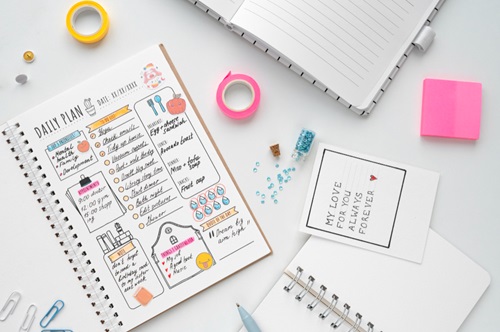Why is Journaling Good for Wellbeing?
Journaling has always allowed children and teenagers to communicate their problems and worries without fear of criticism or punishment (1). Putting ideas and emotions on paper seemed satisfying and made the word clearer and more organized for them. Today, journaling is the process of putting thoughts and feelings on paper to understand them better and it is helpful for people of all ages with anxiety, depression, or stress. This enables them to manage their emotions and enhance their mental well-being.
Why is Journaling Important?
Keeping a journal can be helpful for many reasons (2). It improves creativity, memory, self-awareness, mental health, and motivation, nurturing a sense of accomplishment, relationships, and productivity. Additionally, it helps with self-awareness development, memory recall, and the capture of original thoughts. Writing down your thoughts or feelings helps manage symptoms of depression and other mental illnesses, aiding in planning and work prioritization, and boosting productivity.
Aside from the above, it is hard not to mention how fun it is to create a legacy by giving future generations a glimpse into the writer’s life and character.
The Psychology of Journaling
Psychologists have found that journaling helps people accept mental experiences, which are linked to better psychological health and therapeutic outcomes, including improved mood and decreased anxiety. According to research, journaling can help with acceptance, especially mindful acceptance, a useful strategy for freeing ourselves to move on with life.
Some psychological benefits of journaling include increased cognitive processing which sets up cohesive narratives, and emotional catharsis which releases unconscious tensions through venting negative emotions. Moreover, journaling allows emotional inhibition, promoting cognitive integration and understanding, and repeated exposure to stressful situations, lessening negative thoughts and sensations (3).
Journaling and Psychotherapy
Famously, journaling has been a non-pharmacological tool for psychotherapy for ages,
specifically gratitude journaling and expressive writing (3). Recording feelings through expressive writing across several settings prioritize them above all things, and shifts focus from people and events to personal insights. Conversely, gratitude journaling highlights the positive aspects of life by documenting events and occasions. Those methods can be used for different outcomes and purposes according to personal needs.
What are the benefits of journaling?
According to research, writing has been associated with exposing hidden trauma as it
dives deep into the inner aspects of emotions. This allows for self-understanding and healing. It’s also linked to physical, cognitive, and emotional benefits such as:
- Decreased blood pressure
- Enhanced liver and lung function
- Fewer hospital stays
- Improved moods
- Increased psychological well-being
- Fewer symptoms of depression
- Fewer doctor visits related to stress
- Lower absences from work
- Higher student grade averages.
Implementing gratitude journaling into a daily routine helps people feel happier as they
consistently highlight the things in their lives that bring them joy instead of focusing on the negatives (3).
Next step
Journaling can help people figure out the next step ahead by understanding and analyzing their thoughts and feelings, and incidents or situations become clearer, enabling them to choose the proper next step from an organized and planned perspective (4).
After journaling, you may discover that your feelings are trying to communicate with you. You might understand your needs if you see your worries, questions, and feelings in ink. Even a list of advantages and disadvantages can help you better understand your goals.
How do I start journaling?
It is necessary to select between a paper journal and a digital journal when beginning a
journaling habit. Although handwriting eases idea processing, you can find a suitable method. You may use Google Docs to add a paper journal to your digital journal, or other creative forms. Write every day, whenever you need to, and if you have trouble processing your emotions. Make time each day to write in your journal, whether in the morning, around lunch, or before bed. Keep your journal close with you, to write down your thoughts daily. Let your thoughts run freely without overthinking and editing. Your notebook is for you, so do not worry about language or spelling. Later, you can fix any grammar errors that are upsetting you.
If you find it difficult to write your thoughts, you can still profit from journaling if you are creative with your formatting.
- Try entries in lots of forms until you find one that suits you.
- Creating a list, composing a poem or song, adding pictures, writing a letter to someone, or developing a story can do the trick.
- Create a bullet journal and keep it free of criticism.
- Allow yourself to write about anything on your mind without controlling it.
- Avoid filling your writing with negative feelings such as shame or remorse.
- You have every right to your thoughts and feelings, and your journaling practice is your way of helping them be as healthy as possible.
- Write down whatever is on your mind, the things that happened to you that day, your feelings about it, and any concerns you have, which will help you deal with your thoughts and emotions.
- Continue writing until you feel better, or your timer goes off (5).
How do you overcome obstacles?
Although journaling can be a difficult habit, it is a useful tool for personal development.
Finding the ideal time to write a journal might be difficult, but it is important to prioritize and change your routine accordingly.
- Write about your feelings if you are unsure about what to write first.
- Avoid ignoring or resisting specific issues and concentrate on higher-level viewpoints.
- Although journaling can be intimidating, it is crucial to cultivate empathy and self-compassion.
- If journaling makes you self-conscious, examine your beliefs and imagine your journaling routine if you stop criticizing yourself.
By overcoming these challenges, you can set up a journaling routine that works for you at any time regardless of the circumstances (6).
Takeaway Message
Journaling is an effective technique that fosters resilience, emotional awareness, and
mental and physical health. It gives individuals greater self-control when it comes to expressing their innermost feelings while handling stress and anxiety. By encouraging people to explore their thoughts they gain perspective on their inner selves, and by distinguishing these thoughts from who they are, they free themselves from self-critical or negative thinking. Start journaling today for better well-being and health.
Author: Menatallah Yahia Yousef (Health Content Writer)
Edited by: Damilola Elewa








Comments (0)